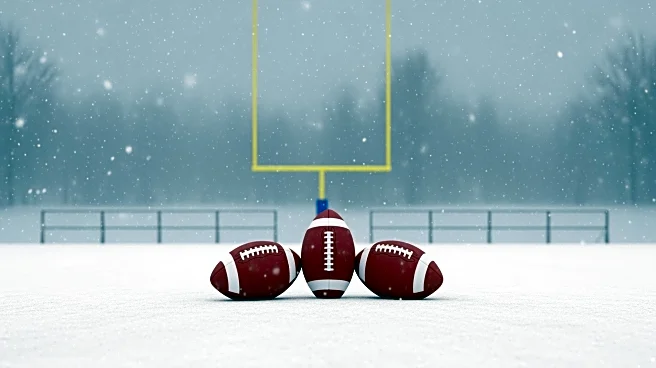What's Happening?
Notre Dame's quarterback, C.J. Carr, led his team to a decisive victory over Navy with a performance that included 218 passing yards and three touchdowns. The game, held in South Bend, Indiana, was marked
by snowy conditions. Carr's efforts contributed to Notre Dame's seventh consecutive win, maintaining their strong season record. The team dominated the game, leading 42-10 by the third quarter, allowing backup quarterback Kenny Minchey to take over. Notre Dame's running back, Jeremiyah Love, also made significant contributions with 94 rushing yards and two touchdowns, including a remarkable 48-yard run. Navy, missing their starting quarterback Blake Horvath due to injury, struggled to maintain their usual rushing dominance, gaining only 52 yards in the second half.
Why It's Important?
This victory is significant for Notre Dame as it solidifies their position in the College Football Playoff rankings, showcasing their ability to perform under challenging weather conditions. The win enhances their reputation and boosts their chances for a strong postseason performance. For Navy, the loss highlights the challenges of maintaining their rushing strategy without their starting quarterback, which could impact their future games and overall season performance. The game underscores the importance of adaptability and depth in team rosters, especially when facing adverse conditions or injuries.
What's Next?
Notre Dame will face Pittsburgh in their next game, aiming to continue their winning streak and strengthen their playoff position. Navy will host USF, seeking to recover from consecutive losses and improve their season record. Both teams will need to address their respective challenges, with Notre Dame focusing on maintaining momentum and Navy on regrouping and strategizing without their injured quarterback.
Beyond the Headlines
The game highlights the impact of weather conditions on sports performance, emphasizing the need for teams to prepare for and adapt to such challenges. It also raises questions about player safety and injury management, as seen with Navy's quarterback situation. The broader implications for college football include discussions on team depth and the importance of backup players in maintaining competitive performance.










